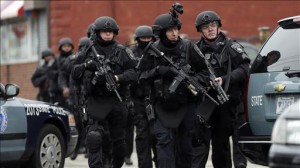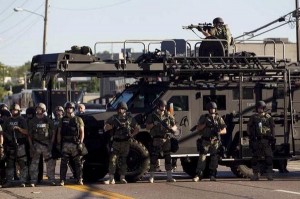By Carolyn Davis
Just about 15 months ago, I sat in front of my television in Brookline, a Boston suburb, and watched on live TV as police officers rolled armored vehicles down the streets of neighboring Watertown. Many of the officers were outfitted in tactical gear fit for urban warfare. They swarmed the residential streets, assuming sniper positions atop cars and roofs. Others swept through homes, guns raised. When suspect Dzhokhar Tsarnaev was finally found in a local resident’s dry-docked boat—lying wounded and curled in the fetal position—police strafed the boat with gunfire. Bullets lodged not only in the boat, but also in neighboring homes up to two doors down. Tsarnaev was later found to not have fired a single shot in that final exchange. In the short term, most of us felt relief. However, the sheer firepower exhibited by local police that day has continued to trouble me since.
The images coming out of Ferguson, MO, once again have revealed the startlingly vast capacities of modern police forces to rival advanced military units in tactical gear (regrettably, however, this comparison extends to neither discipline nor training). And we have seen as well the psychotropic powers of such scenarios. Civilian police forces seem increasingly imbued with a sense that they are engaged in urban warfare against enemy combatants. In Ferguson, the contrast is especially stark: a predominantly white police force, dressed for combat and armed to the teeth, facing off with predominantly black citizens and protestors.
Recent commentaries from Talking Points Memo editor Josh Marshall and Dan Arel at Patheos.com have sought to separate the discourses of police militarization from racist policing practices. They are each concerned that conflating the two risks obscuring or dismissing the long American history of racist police brutality. Their concerns are apt. In Ferguson, police outfitted in tactical fatigues atop armored vehicles aim guns at an unarmed black citizenry standing in protest. Such a confrontation is unmistakably the extrapolation of the volatile combination of racism and inordinate power that infects local police forces across the country. However, I suspect there is more nuanced connection between racism and police militarization in the United States that demands engagement.
How and why did we come to unquestioningly welcome tactical police gear and armored vehicles on our city streets? The presence of enough tactical equipment to support the defense needs of a small nation would not be possible without the establishment of a dangerous but profitable American ideology of state power at home and abroad. However, I would argue that the hyperaggression of police in Ferguson would not be possible without the state power amassed from the pervasive undercurrent of racist microaggressions that pervade American life.
The violence of recent days reveals the intersection of a host of critical issues that generally remain compartmentalized in public discourse. We talk about the rise of the prison industrial complex, of racism and brutality in law enforcement, of the questionable militarization of civilian police departments. Ferguson makes clear the desperate need for these phenomena to be examined as expressions of a larger problem. If we are willing to engage it, the situation in Ferguson has incited a powerful moment for the American conscience.
Overwhelming force against an unarmed citizenry can wake us up. But it is the compounding effect of so many stop-and-frisks, unwarranted traffic stops, questionable searches and seizures, and everyday oppressions that make it possible to incrementally advance a consolidated sense of unified (white) state power without public revolt (not to mention the demoralization of generations of people for whom incarceration is a fact of life for either themselves or their immediate family members). Further, the establishment of a relatively docile citizenry becomes relatively easy to achieve when white folks believe that they sit comfortably on the right side of state aggression.
Domestically, these ideas leave most Americans unwilling to question or challenge a system that quietly funnels a staggering number of black men into its machinations by beginning early. Policing and sentencing laws destroy the capacity of so many black youths to escape cycles of petty crime and drastic sentences of incarceration. At the heart of this system, not surprisingly, is profit—privatized prison contractors who benefit from increasingly high rates of recidivism. The system profits significantly from exploiting increasingly entrenched social ideas about deterrence and rehabilitation.
An armored police force is not, as Foucault would remind us, a necessity in such a system of pervasive racism. But police militarization can become a natural extension when one recalls its link to the state at large.
American foreign policy echoes the confidence in the capacity (and authority) of the state to exert disproportionate force for deterrence and social rehabilitation. The rise of nation-building as a foreign policy doctrine for most of the American Century proved equally profitable for defense and military contractors. It went equally unquestioned by most Americans, who retained confidence in the ideals of the United States as an ideological beacon for world order and democratic progress.
When this doctrine is turned outward, we run tanks down the streets of Baghdad. Turned inward, we run tanks down the streets of Watertown and Ferguson. And again, we are remiss not to recognize the role of profit and privatization in American police militarization. Weapons and defense contractors benefit from stoking the hypervigilance of the modern police force, outfitting American police units while enjoying the excesses of Defense Department contracts.
 It must be recognized that the militarization of the American police force exists not apart from, but deeply enmeshed with the rise of a prison industrial complex that relies on the early and repeat incarceration of society’s disenfranchised. The personification of an American military as a global police force becomes a natural complement to domestic “values” as well as capitalist exploitation. Such ideology feeds on ideals of social purity, moral righteousness, and firm boundaries between enemies and allies. It is the same ideology that has empowered increasingly-armed police forces to carry out racist and mortally dangerous policing practices at the expense of basic civil liberties.
It must be recognized that the militarization of the American police force exists not apart from, but deeply enmeshed with the rise of a prison industrial complex that relies on the early and repeat incarceration of society’s disenfranchised. The personification of an American military as a global police force becomes a natural complement to domestic “values” as well as capitalist exploitation. Such ideology feeds on ideals of social purity, moral righteousness, and firm boundaries between enemies and allies. It is the same ideology that has empowered increasingly-armed police forces to carry out racist and mortally dangerous policing practices at the expense of basic civil liberties.
Meanwhile, many of us continue to live in the in-between. We are generally privileged to enjoy neither the regular and racialized threat of police intimidation and incarceration, nor the receiving end of troubling foreign policy. What does this mean, specifically, for those engaged in prophetic scholarship and public intellectualism? I think it means redoubling our efforts to raise questions about the links between racism, power, and the state. Speaking of armored vehicles and racist policing is not an either/or proposition, but a deeply enmeshed problem for the modern state. I urge Josh Marshall and Dan Arel to continue reflecting on these connections.
A Coda
Feminist scholars have the advantage of working and talking across often-siloed discourses. I hope that we can continue to find ways to integrate such questions into our research, writing, and teaching. What does it mean for a feminist to ask about the nature of policing a citizenry? Further, where do these questions intersect, on the ground, with the lives of women and the marginalized? Strong examples of such reflection have come from The Nation’s Dani McClain and The Feminist Wire’s Tamura Lomax, who each argue that the need for communities safe from police brutality and racist criminal “justice” is deeply tied to the feminist/womanist quest for flourishing.
In Frames of War, Judith Butler writes, “Precarity designates that politically induced condition in which certain populations suffer from failing social and economic networks of support and become differentially exposed to injury, violence, and death.” The precariousness of black life in America has been invoked again this week. The deployment of militarized instruments of force in Ferguson and elsewhere only reinforces the precarity of certain civilian lives before the modern state. I hope that feminists and public intellectuals alike can continue to link thoughtful and integrated responses to the pervasive idolatry of American firepower that has seduced our civic life.
__________________________________
 Carolyn Davis recently received her Ph.D. in Religion from Vanderbilt University, where she specialized in Theological Studies, Philosophy, and Women, Gender, and Religion. Her research examines the relationships between human sexuality, young people, popular and political rhetoric, and feminist theology and philosophy. She currently resides in Washington, DC, where she is engaged in several projects relating faith communities to reproductive justice and faith-based youth sexuality education. She is also an ordained minister in The United Methodist Church.
Carolyn Davis recently received her Ph.D. in Religion from Vanderbilt University, where she specialized in Theological Studies, Philosophy, and Women, Gender, and Religion. Her research examines the relationships between human sexuality, young people, popular and political rhetoric, and feminist theology and philosophy. She currently resides in Washington, DC, where she is engaged in several projects relating faith communities to reproductive justice and faith-based youth sexuality education. She is also an ordained minister in The United Methodist Church.
The post Police Militarization, Race, and American Ideology: A Response to Dan Arel and Josh Marshall appeared first on The Feminist Wire.